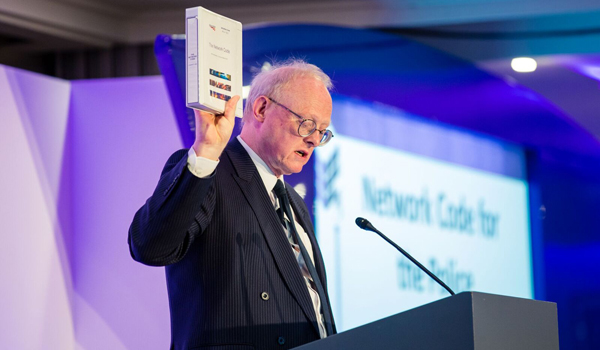HMCIC: Productivity key to faster improvement than ‘simple’ pledges on police numbers
Radical reform and investment in technology will produce faster improvements in productivity than attempting to recruit 20,000 officers according to Her Majesty’s Chief Inspector of Constabulary.
In a rebuff to Wednesday’s (July 3) pledge by would-be Prime Minister Boris Johnson, Sir Thomas Winsor urged reform to the 43-force structure of policing and called for priority be given to greater productivity.
In his campaign to be elected Conservative Party leader, Mr Johnson has promised to fund the recruitment of 20,000 police officers in England and Wales over three years, but Sir Thomas said technology and techniques can produce swifter benefits.
In a briefing to journalists, Sir Thomas warned that the police cannot meet 100 per cent of demand with 70 per cent of funding and that “something has to give”. And he called for the public to have a say on whether there should be greater investment in policing or an acceptance of serious harm that results from the current failing criminal justice system.
“What level of risk, and what level of harm is the public prepared to tolerate because the police are not fully resourced to meet it, or does the public want to provide more money so the amount of risk or offending can be reduced?”
In his State of Policing 2018 report, published on Thursday (July 4), Sir Thomas said most police forces were performing well, and praised officers and members of staff for their integrity and bravery. But he also called on police leaders to make bold and long-term decisions to improve policing.
He said there was continued controversy about the 43-force structure of policing in England and Wales, with a need for the police service to function as part of a single law enforcement system.
He said new mandatory standards should be considered to prevent inefficiency and ineffectiveness in policing, and indicated that a ‘Network Code’ – an agreement to abide by majority voting on major issues, especially on technology standards – would soon be published.
Borders between forces should not be erased he said, but while localism has its place, the current structure was created in 1962 for a very different set of circumstances that existed then.
He said the Government should dust off the Police Act to mandate national standards.
He attacked the current resourcing arrangements for forces as “a mismatch between police funding and public expectations”. And annual financial settlements for forces are incompatible with efficient and effective long-term planning, he said.
Strikingly, poorer people are less safe, Sir Thomas believes, because an increasing share of police funding is taken from the local Council Tax precept, and richer areas, generally, pay more towards policing.
And he recommended that policing receive a multi-year settlement apart from poorer performing forces.
As the Conservative Party is set to vote on a new leader and successor to Theresa May as Prime Minister, Sir Thomas warned that simple pledges to recruit police officers would not repair the current failings and inefficiencies in the criminal justice system.
The £1.1 billion cost of recruiting the 20,000 officers Mr Johnson pledged to fund, would rapidly grow in subsequent years as the new recruits advanced up the pay scales. But, he urged the service and politicians to look to longer-term investment in technology, such as body-worn video, fully-functional hand-held mobile devices, facial recognition and artificial intelligence, first.
For example, he was taken aback by the waste of time and effort seen on a recent visit to Cleveland Police. He said it was “extraordinary” that the force did not make a £300,000 investment to roll out body-worn video cameras to all its frontline officers, they are still using paper notebooks which required typing up back at stations and have to queue up at the end of their shift as there are not enough laptops.
“This is as inefficient as you could possibly imagine,” he added.
“What the public want is the productivity of 20,000 people of the past, that doesn’t mean they need 20,000 people.”
Sir Thomas suggested low cost solutions are being employed in the private sector that could help police forces deal with the mass of digital evidence overwhelming investigators and leading to a collapse in prosecutions. For example, artificial intelligence is being used much more effectively than human resources to scan documents in commercial legal matters.
Sir Thomas said the “wider criminal justice system is dysfunctional and defective” and rehabilitation needed to be taken more seriously, with people released from prisons guaranteed proper support in dealing with benefits and finance, and finding work and accommodation.
Sir Thomas also backed changes in legislation, to concentrate the minds of directors of large technology companies that “allow harmful materials on their websites”, supporting the introduction of criminal liability for senior managers. He urged the Government to bring forward legislation that will enact ‘Sammy’s Law’ – which aims to give people a defence to crimes their abusers force them to commit.
Writing in the State of Policing 2018 report, Sir Thomas concluded: “I believe that some profound and far-reaching aspects of police reform are called for. For these reforms to take place, leaders in central government, [police and crime commissioners] and chief constables will all need to make bold, long-term decisions.
“If they don’t, the windspeed of police reform will fall to a flutter, leaving the police service increasingly unable to meet the demands it faces. The inevitable legacy of such an approach would be unacceptable compromises in both the quality of service the police can offer the public and the level of public safety and security the police can uphold.
“But if the reforms I have set out in my assessment are carried out, competently, comprehensively and with resolve, they will secure major improvements in police effectiveness and efficiency. The widening gap…between the public’s needs and the police’s capacity and capability, will begin to narrow. And the police service will be better able to adapt to face the demands of today and tomorrow, to the great benefit of all of us.”
Responding to the report, Chair of the National Police Chiefs’ Council Martin Hewitt said: “This is a broad report that raises many of the significant issues facing the police service today. It recognises the hard work and dedication of our officers but also the enormous strain they are under and the gap between our resources and the mission we’re asked to fulfil.
“The findings make clear that we can only deliver effective justice if all of the criminal justice system works together. To do that, all those with a part to play must be properly resourced, and as the report points out, that isn’t currently the case. Sir Tom makes a compelling case for long-term sustainable funding.
“The rise in violent crime has been well documented but we’re also seeing an increase in the volume of other crimes and non-crime incidents like mental ill health. That pressure, coupled with the increase in complex, time and resource consuming investigations, is having a tangible impact on the wellbeing of our staff and we’re working hard to support them.
“I recognise the points made about making the police service work better on cross force threats. We need to build our ability to operate at a local, regional and national level whilst keeping accountability with the public we seek to protect.”
The Association of Police and Crime Commissioners (APCC) said as well as PCCs’ role in commissioning victims services, the Ministry of Justice is developing new probation arrangements that will give them a stronger role in resolving some of the problems with offender management that Sir Thomas flagged in his report.
APCC Lead for Performance, Matthew Scott PCC said: “Police and Crime Commissioners advocate the necessity for multiyear financial settlements for all forces to allow for effective short- and medium-term financial planning. PCCs have consistently made this case to government.
“We know that that best way to reduce violence in our communities is to invest in preventative measures, and PCCs are best placed to deliver this work locally. We will continue our work to ensure a better and more sustainable policing settlement, for all forces. It is vital we have a whole-system cross-Government approach to this, including reinvigorating local partnerships through bodies such as Community Safety Partnerships. In addition, the reduction in youth services and the significant rise in school exclusions needs to be addressed.”







